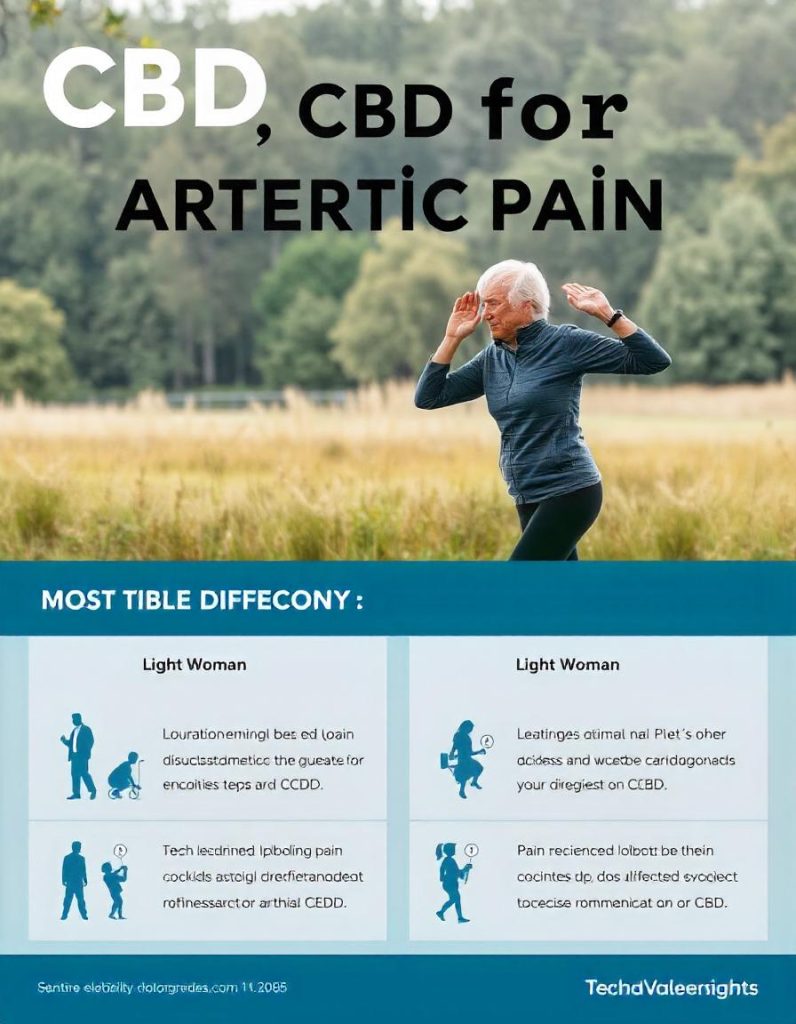
CBD for Arthritis Pain
Understanding CBD: What is it?
Cannabidiol, or CBD, is an active compound derived from the cannabis plant, known for its potential therapeutic benefits without the intoxicating effects commonly associated with marijuana. While CBD is extracted primarily from hemp (a variety of cannabis with minimal THC levels), the compound itself does not induce a “high.” Legally, CBD products must contain less than 0.3% THC, the psychoactive compound responsible for the euphoric effects of cannabis.

CBD and Arthritis: Exploring the Evidence
A limited but growing body of research, including animal studies and small-scale human trials, suggests that CBD may have pain-relieving and anti-inflammatory properties. However, larger, high-quality studies are necessary to confirm these findings in human subjects. Although some arthritis patients report positive outcomes, such as pain reduction, improved sleep, and reduced anxiety, others may find little or no relief.
Since CBD is not a one-size-fits-all solution, its effectiveness can vary. This variance is attributed to factors like individual body chemistry, the form of arthritis, and the type of CBD product used. Just as with conventional arthritis treatments, some individuals may experience notable symptom improvements with CBD, while others may see little to no effect.
Safety of CBD for Arthritis Patients
Although CBD is generally considered safe at moderate doses, the full spectrum of its effects—particularly for people with arthritis—remains under-researched. Some potential side effects of CBD include liver impairment and possible impacts on fertility. Additionally, CBD can interact with certain medications, posing potential risks for individuals taking drugs commonly prescribed for arthritis.
Potential Drug Interactions
CBD’s interaction with other drugs is primarily theoretical or based on animal studies, focusing on its metabolic processing. Certain over-the-counter drugs, including ibuprofen (Advil), naproxen (Aleve), and acetaminophen (Tylenol), may interact with CBD. Furthermore, people taking corticosteroids, specific antidepressants, or fibromyalgia medications, such as gabapentin and pregabalin, should exercise caution and consult their doctor before using CBD. There’s also a risk that high doses of CBD may produce THC-like effects, especially with long-term use.
The most significant safety concern lies in the lack of strict labeling standards for CBD products, making it essential for consumers to verify product contents and ensure that they don’t contain any harmful additives or contaminants.

Legal Status of CBD
CBD derived from hemp is no longer classified as a Schedule I drug at the federal level in the United States. However, its legal standing remains complex, subject to state-specific laws and evolving regulations. Although CBD can be legally purchased in most states and online, users should stay informed about potential changes in legislation that may impact its accessibility.
It is also worth noting that consuming CBD products may result in traceable amounts of THC in one’s system, potentially impacting drug tests or leading to unintended legal consequences.
Should You Try CBD for Arthritis Pain?
The lack of robust clinical studies on CBD and arthritis means that healthcare professionals cannot definitively state who may benefit or what doses and forms would be most effective. However, certain considerations can guide individuals contemplating a CBD trial:
- Consultation First: CBD should not replace disease-modifying treatments for inflammatory arthritis. Before trying CBD, patients are encouraged to discuss it with their healthcare provider to assess any prior treatments and evaluate alternative options.
- Tracking Progress: If embarking on a CBD trial, maintaining a journal to document symptoms, doses, and any observed changes can help patients and doctors determine its efficacy over time.
- Expense: High-quality CBD products can be costly, especially if taken long-term. Patients should ensure they’re obtaining real, measurable benefits before committing financially.

Natural Remedies for Arthritis: The Potential of CBD Oil 2024
Choosing the Right CBD Product: CBD for Arthritis Pain
CBD products come in various forms, each with unique benefits and drawbacks, allowing for flexible usage based on individual preferences and needs.
1. Capsules
CBD capsules are ingested and absorbed via the digestive tract, resulting in a slow onset of effects (often one to three hours). These capsules may be suitable for routine daily use once a safe dose is established.
2. Edibles
Though CBD-infused gummies, cookies, and drinks are available, their dosage can be inconsistent, and they often contain unnecessary sugar. Edibles are also tempting to children, so they must be stored out of reach.
3. Sprays and Tinctures
CBD sprays and tinctures are absorbed quickly under the tongue (sublingual administration), with effects generally felt within 15 to 45 minutes. However, the taste can be unappealing, and if swallowed, their onset mirrors that of capsules.
4. Topicals
Topical products such as creams, lotions, and balms are applied directly to the skin over painful joints. These products may provide localized relief, though it’s unclear how much CBD penetrates below the skin. Many topicals also contain additional ingredients like menthol or capsaicin, which may contribute to the relief rather than the CBD itself.
5. Inhaled CBD
Inhalation through vape pens allows rapid absorption of CBD, though it’s generally discouraged due to potential respiratory risks, particularly for individuals with inflammatory conditions. Some inhaled products may contain harmful additives, such as vitamin E acetate, linked to severe lung issues.
CBD for Arthritis Pain: How to Determine the Right Dosage?
Because there are no universally accepted dosage guidelines for CBD, experts recommend a “start low and go slow” approach. For example, starting with 5–10 mg of CBD twice daily may help gauge its effects without overwhelming the system. Over several weeks, users may gradually increase the dose as necessary until the desired relief is achieved. While CBD rarely causes severe side effects, it can be costly if high doses are required.
In states where it’s legal, individuals may explore low-dose THC in combination with CBD under a doctor’s supervision. THC may enhance the effectiveness of CBD, but users should approach this option cautiously as THC can induce mild cognitive and motor impairments.
If, after consistent use, CBD alone or in combination does not relieve symptoms, it’s likely best to discontinue use and seek alternative therapies.
Shopping Wisely CBD for Arthritis Pain: Choosing Quality CBD Products
Since CBD products are largely unregulated, consumers should approach shopping with caution. Mislabeling, contamination, and inaccurate CBD concentration claims are common issues in the CBD market. To ensure product quality and safety, consumers should consider the following:
- Domestic Manufacturing: U.S.-produced CBD products are often subject to higher quality standards, and sourcing from reputable domestic companies can reduce the risk of contamination.
- Good Manufacturing Practices (GMP): Choose brands that adhere to FDA-recommended GMP standards, which, while voluntary, signal a commitment to quality. Some states also enforce manufacturing standards.
- Third-Party Testing: Seek products tested by independent labs that use validated testing methods recognized by authoritative organizations. Look for a Certificate of Analysis (COA) to verify CBD concentration and ensure the absence of harmful additives.
- Avoid Overzealous Claims: Companies claiming that CBD can cure or prevent diseases are unreliable. Remember, no over-the-counter CBD product is FDA-approved for treating specific medical conditions, and marketers are not licensed healthcare professionals.

Navigating Regulatory Warnings and Filing Complaints
The FDA has issued warnings to CBD manufacturers misrepresenting their products, cautioning consumers to remain vigilant about exaggerated claims. If you encounter CBD products with misleading health claims, you may report them to the Federal Trade Commission (FTC) for regulatory action.
Final Thoughts
CBD for Arthritis Pain, CBD offers potential as a complementary therapy for arthritis pain and other related symptoms, but it is not a standalone solution. Its effects vary widely, and ongoing research will help clarify its role in arthritis treatment. For those considering CBD, a consultative approach with healthcare providers is essential. Together with informed shopping and careful monitoring, these measures can help arthritis patients make safer and more effective choices in their quest for relief.
If you want to read more information about CBD, wellness, Healthcare, and much more related to healthcare, visit –>cbdforhuman (cbdnep.com)
